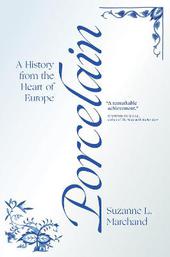
|
Porcelain: A History from the Heart of Europe
Paperback / softback
Main Details
| Title |
Porcelain: A History from the Heart of Europe
|
| Authors and Contributors |
By (author) Suzanne L. Marchand
|
| Physical Properties |
| Format:Paperback / softback | | Pages:544 | | Dimensions(mm): Height 203,Width 133 |
|
| Category/Genre | Economic history |
|---|
| ISBN/Barcode |
9780691204239
|
| Classifications | Dewey:338.4766650943 |
|---|
| Audience | |
|---|
| Illustrations |
16 color + 40 b/w illus. 9 tables. 2 maps.
|
|
Publishing Details |
| Publisher |
Princeton University Press
|
| Imprint |
Princeton University Press
|
| Publication Date |
24 May 2022 |
| Publication Country |
United States
|
Description
A sweeping cultural and economic history of porcelain, from the eighteenth century to the present Porcelain was invented in medieval China - but its secret recipe was first reproduced in Europe by an alchemist in the employ of the Saxon king Augustus the Strong. Saxony's revered Meissen factory could not keep porcelain's ingredients secret for long, however, and scores of Holy Roman princes quickly founded their own mercantile manufactories, soon to be rivalled by private entrepreneurs, eager to make not art but profits. As porcelain's uses multiplied and its price plummeted, it lost much of its identity as aristocratic ornament, instead taking on a vast number of banal, yet even more culturally significant, roles. By the nineteenth and twentieth centuries, it became essential to bourgeois dining, and also acquired new functions in insulator tubes, shell casings, and teeth. Weaving together the experiences of entrepreneurs and artisans, state bureaucrats and female consumers, chemists and peddlers, Porcelain traces the remarkable story of 'white gold' from its origins as a princely luxury item to its fate in Germany's cataclysmic twentieth century. For three hundred years, porcelain firms have come and gone, but the industry itself, at least until very recently, has endured. After Augustus, porcelain became a quintessentially German commodity, integral to provincial pride, artisanal industrial production, and a familial sense of home. Telling the story of porcelain's transformation from coveted luxury to household necessity and flea market staple, Porcelain offers a fascinating alternative history of art, business, taste, and consumption in Central Europe.
Author Biography
Suzanne L. Marchand is the Boyd Professor of History at Louisiana State University. Her books include German Orientalism in the Age of Empire and Down from Olympus (Princeton).
Reviews"Winner of the Ralph Gomory Prize, Business History Conference" "Finalist for the PROSE Award in European History, Association of American Publishers" "[A] sweeping economic, social and cultural history of central Europe. . . . unorthodox and engaging."---Marc Levinson, Wall Street Journal "A wide-ranging and thorough study. . . . this is a riveting story, well told . . . by Marchand, who illuminates so much in an original and entertaining way."---Tim Blanning, Literary Review "As Suzanne Marchand shows in her meticulous new book, porcelain has been integral to German life since its reinvention in Saxony in 1708." * The Economist * "As an economic-business history, Marchand's work is a landmark achievement. . . . Porcelain is a monumental achievement in scope and breadth in illuminating porcelain's European beginnings and its increasingly fragile position in the markets of the present."---Megan Brandow-Faller, Central European History "Marchand paints a colourful picture of the day-to-day life of porcelain factories."---Caroline McCaffrey-Howarth, Apollo "To weave together cultural, economic, and social history so masterfully takes great historiographical experience and skill. All those who are interested in nineteenth-century German intellectual history admire Suzanne Marchand's books on the reception of classical antiquity and orientalism. Now she has surprised us with something completely new"---Jurgen Osterhammel, Frankfurter Allgemeine Zeitung "Marchand, a specialist in German history, writes with clarity."---Norma Clarke, Times Literary Supplement
|